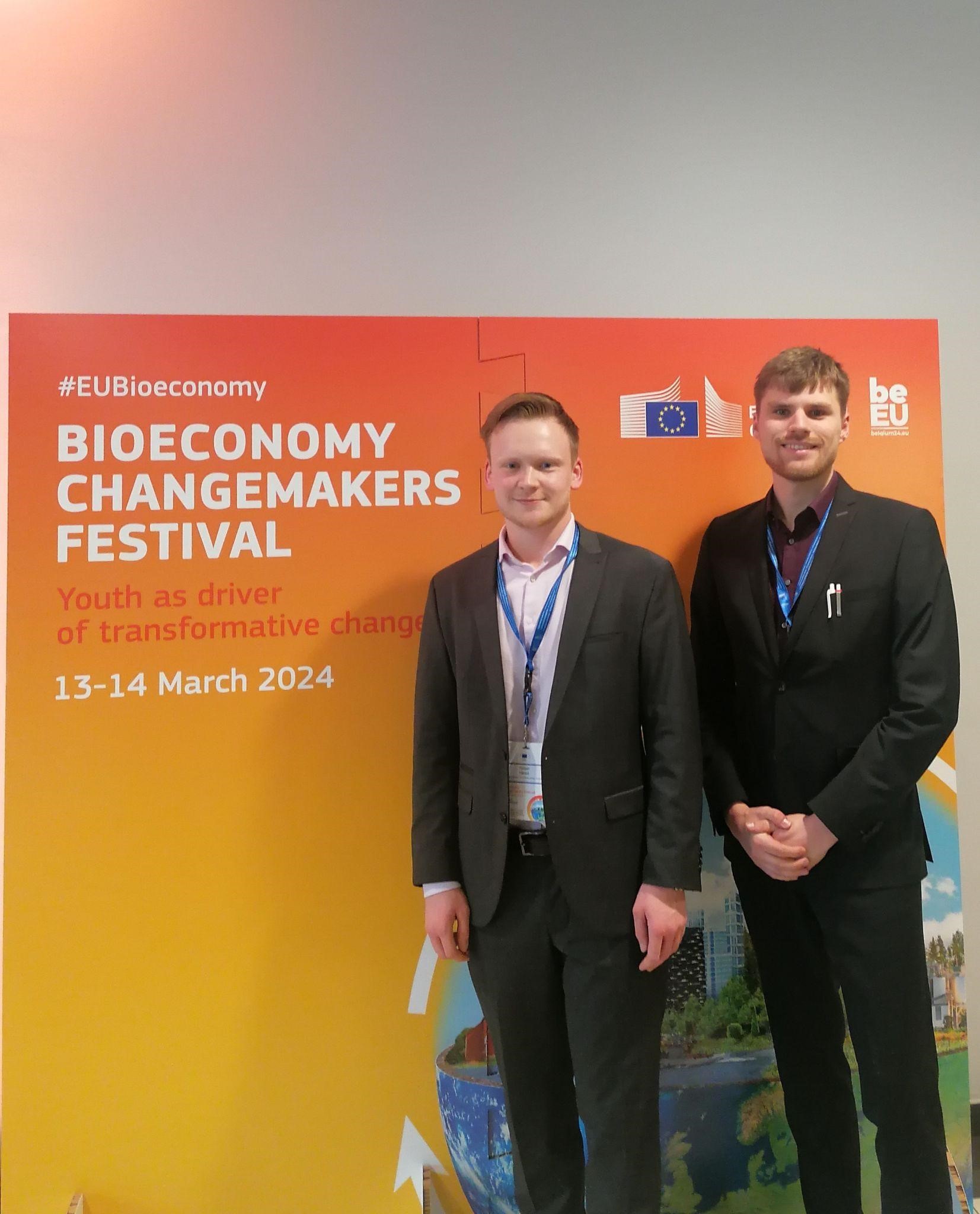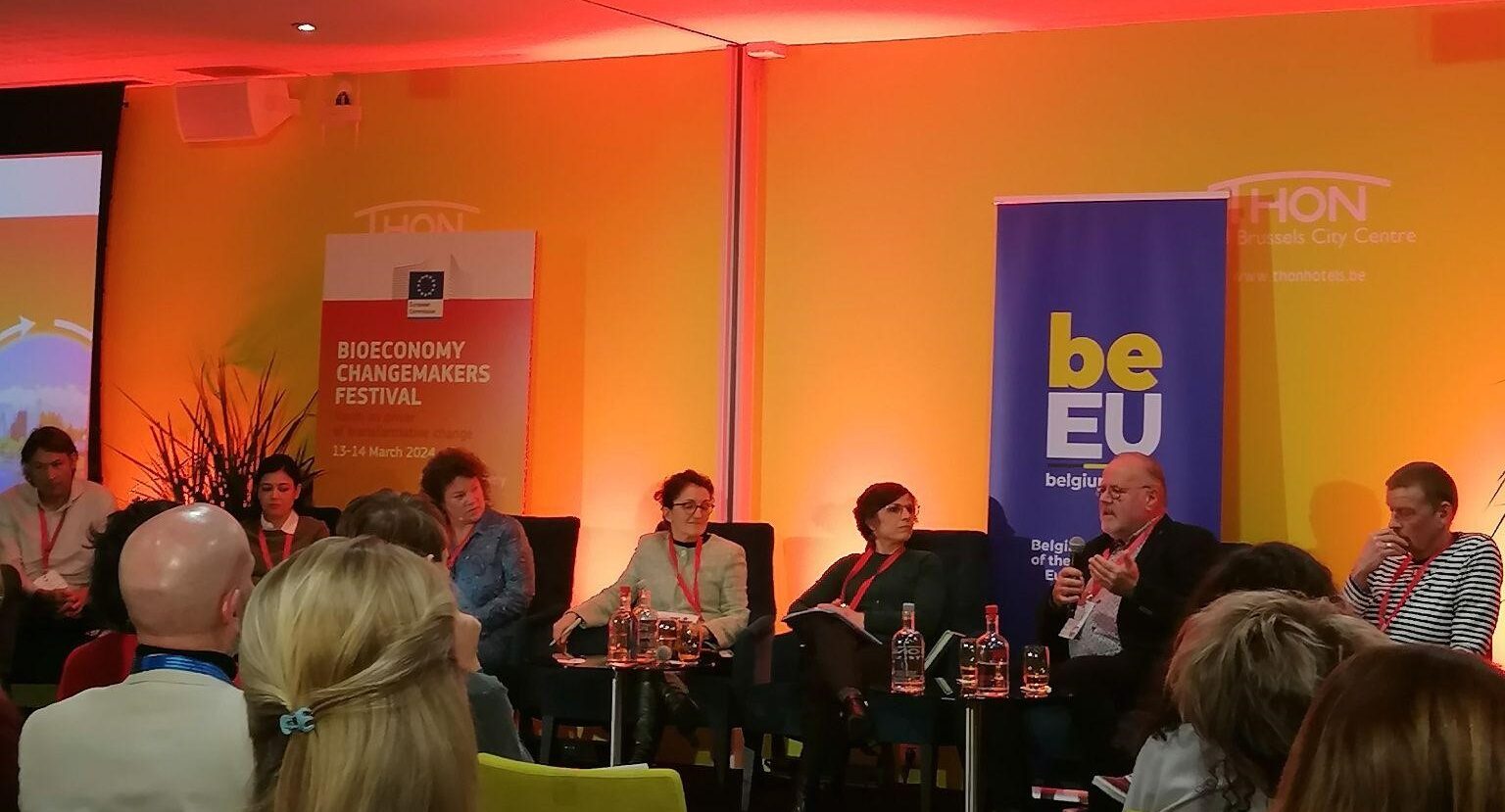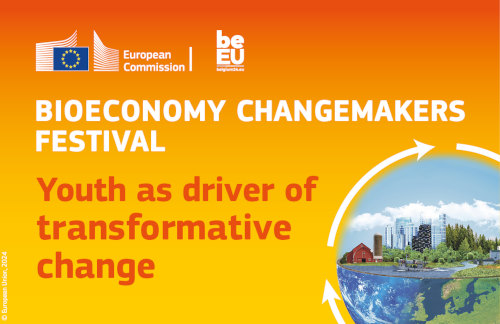In the week of 11th to 15th March 2024, the European Commission, Directorate General Research & Innovation, together with the Bioeconomy Youth Ambassadors, organized the Bioeconomy Changemakers Festival. Over the Festival week, about 3,000 participants learned about and discussed the European bioeconomy in more than 30 satellite events all across Europe.
The Festival culminated in a high-level event from Wednesday to Thursday, the 13th – 14th March 2024, with 300 participants from relevant youth organizations, civil society stakeholders, and governmental organizations.
GASB was happy for the chance to attend with two representatives and participate in the discussions on the future of the European bioeconomy and its economic, societal, and environmental implications.

GASB representatives Florian Hänsel and Tim Render (left to right) at the High-level event of the EU Bioeconomy Changemakers Festival in Brussels
After a high-level opening including keynotes by the EU Commissioner for Innovation, Research, Culture, Education and Youth, Ilania Ivanova, and the EU Director of Healthy Planet, John Bell, the floor was given to the Bioeconomy Youth Ambassadors, who for several months and in close collaboration with many youth organizations from across Europe, had prepared a Bioeconomy Youth Vision and presented their work to the audience. Key aspects of the Youth Vision, including enhanced communication among generations and across sectors and stakeholders, and a clear mission for connecting people with nature through a circular and sustainable model of consumption, were discussed with present representatives from civil society, and input and feedback from satellite events were also addressed.
The afternoon sessions on the first day revolved around „Supporting young changemakers to develop and scale solutions“ and „Going from niche to norm: views from industry and civil society“. In these panels, the importance of technology transfer and common pitfalls in scaling solutions to enhance sustainability were discussed and examples of successful changemakers and their approaches were presented. Furthermore, the relevance of a developed bioeconomy for the autonomy of the European market and the governance of biomass and sustainable use of biogenic resources were addressed. Different approaches to moving away from fossil fuels, promoting collaborations between the private and public sectors, and properly engaging all stakeholders in the process were debated to develop bioeconomy approaches into becoming the new norm. Although briefly, the panel also discussed the role of innovative approaches, such as the application of new genomic techniques in agriculture and biomanufacturing, and concluded these approaches to be a relevant part of the process.

Panel discussion “Going from niche to norm: views from industry and civil society”.
Panel (left to right): Rob Beekers (Bio-based Industries Consortium), Laura Maragna (EU4Algae), Tamsin Rose (moderator), Oana Neagu (COPA COGECA), Fanny-Pomme Langue (European Bioeconomy Alliance), Will van den Tweel (Food Fermentation Europe), Peter Gerhardt (Denkhaus Bremen)
The second day started with another high-level opening, including a keynote by bioeconomy pioneer and former Director of the Directorate Research & Innovation, Christian Patermann, who outlined the history of European bioeconomy initiatives and underlined the importance of a coherent and holistic approach to continuing these efforts into a resilient and sustainable bioeconomy for Europe. The following panel further discussed the relevance of coherent policies to support the bioeconomy, putting particular emphasis on governing food systems and waste management, long-term carbon-storing applications, enabling funding opportunities, and the importance of science and knowledge to properly design and assess appropriate policies.
Afterward, key focus aspects of the future EU bioeconomy were explored in breakout sessions, where GASB representatives participated in the session on „Biomanufacturing & biotechnology as a driver for solutions“. The session provided an overview of the European biotechnology and biomanufacturing landscape, and initiatives to support enterprises in the industry, and identified clear bottlenecks for the future development of the field. While Europe holds great potential in research and development of biotechnological applications, the realization of their potential often fails in research transfer to the market. Although there is an increasing market demand for sustainable solutions, unclear and incoherent policies and inefficient regulatory approval processes, but also the still reluctant consumer acceptance for biotechnologically produced goods causes a heterogenous and inefficient access to the market and impairs investment opportunities to enable scale-up of solutions. Coherent, evidence-based, efficient regulations and access to pilot infrastructure need to be accompanied by tangible sustainability and health assessment measures as well as purposive science communication to build consumer trust and enable microorganisms as the microchips of a prospering bioeconomy.
Before the closing of the event, the Bioeconomy Youth Ambassadors formally handed over their Youth Vision to the EU Commission Executive Vice-President for European Green Deal, Interinstitutional Relations and Foresight, Maroš Šefčovič. Representatives from the Belgian and Hungarian governments, which are splitting the presidency of the European Union in 2024, shared their visions for continuing the conversation, before Peter Wehrheim, the Head of Unit Bioeconomy and Food Systems at the Directorate General Research & Innovation of the European Commission, wrapped up a very insightful conference. Two days of fostering communication among different stakeholders and particularly providing Youth with a platform for communication provided every attendee with the motivation and inspiration to contribute to the process of bringing sustainable solutions to scale and shaping the future of the European bioeconomy.

The Belgian flag and the flag of the European Union waving from the town hall at Grand Place, Brussels.

